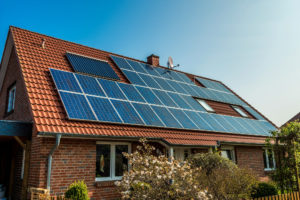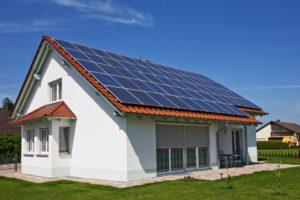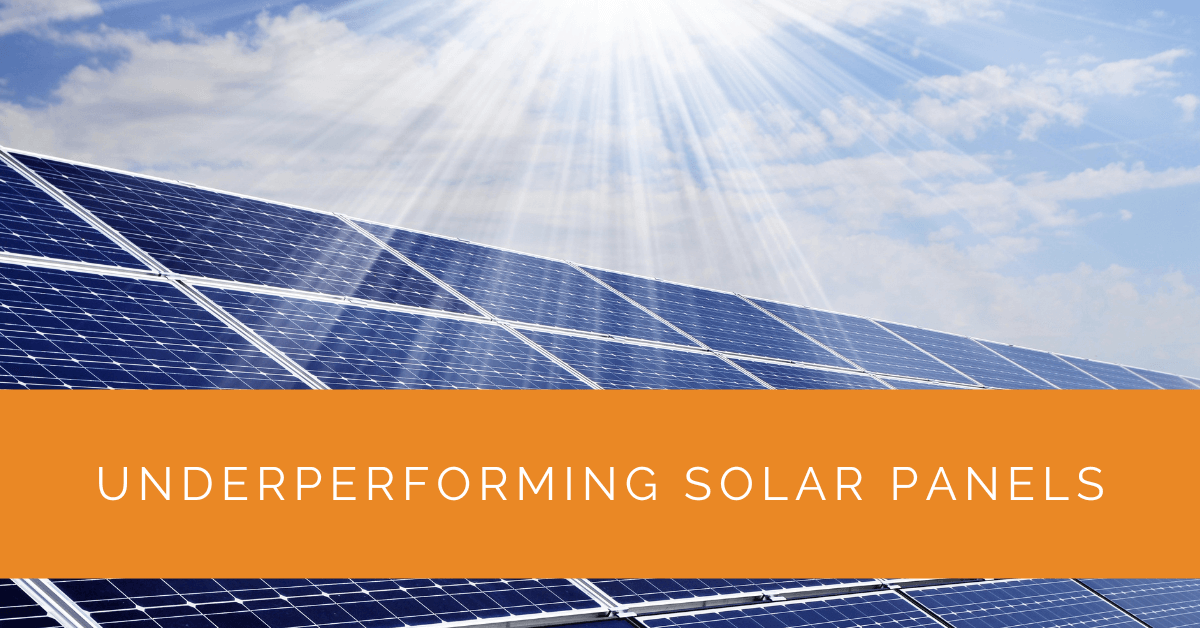Solar panels play a crucial role in generating clean and renewable energy. However, underperforming solar panels can hinder the optimal production of solar power. In this article, we will explore common issues that can cause solar panels to underperform and provide solutions to address them. Understanding these factors will help you maximize your solar panel system’s energy output and efficiency.
Contents
- 1 Key Takeaways
- 2 Factors Affecting Solar Panel Performance
- 3 Identifying Underperforming Solar Panels
- 4 Steps to Address Underperforming Solar Panels
- 5 Maximizing Solar Panel Performance
- 6 Expert Insights From Our Solar Panel Installers About Underperforming Solar Panels
- 7 Case Study: Addressing Underperforming Solar Panels
- 8 Experience Solar Excellence with Us!
- 9 Conclusion
- 10 FAQ
Key Takeaways
- Shading, inverter problems, panel degradation, and electrical issues can all contribute to underperforming solar panels.
- Monitoring energy output and identifying signs of underperformance is crucial for prompt action.
- Steps to address underperforming solar panels include shading mitigation, inverter troubleshooting, regular maintenance, and professional inspections.
Factors Affecting Solar Panel Performance
Solar panel performance is influenced by various factors that can impact their efficiency and power output. Understanding these factors is essential for diagnosing and addressing underperformance in your solar panel system. Let’s explore some key factors in detail:
Shading
Shading has a significant impact on solar panel performance. Even partial shading can cause significant power losses in the affected panels. Trees, nearby buildings, or other objects casting shadows can obstruct sunlight and reduce energy production. It is crucial to consider shade analysis during the installation process to minimize the effects of shading.
Inverter Problems
Inverters play a critical role in converting the DC power generated by the solar panels into AC power for use in your home or to feed back into the grid. Inverter malfunctions or failures can lead to underperformance of the entire solar panel system. Issues such as communication errors, component failure, or firmware/software problems can affect solar panels’ efficiency and power output.
Panel Degradation and Aging
Over time, solar panels can experience degradation and efficiency losses due to various factors, including exposure to the elements. Environmental conditions such as temperature fluctuations, moisture, and UV exposure can contribute to the aging of panels. This degradation can result in reduced power output and overall system efficiency. Regular maintenance and monitoring can help identify and address panel degradation issues promptly.
Electrical Issues
Electrical issues can also cause underperformance in solar panel systems. Loose connections, faulty wiring, or problems with the electrical grid connection can disrupt the flow of electricity and reduce power output. Proper installation, including correct wiring and secure connections, is crucial to prevent these issues. Regular inspections and electrical testing can help identify and resolve potential electrical problems.
By understanding these factors and their impact on solar panel performance, you can take appropriate measures to optimize your system’s efficiency and power output.

Identifying Underperforming Solar Panels
Detecting underperforming solar panels is crucial for maintaining the optimal performance of your solar panel system. You can promptly address the issue by monitoring your system and recognizing signs of underperformance. Here are some key aspects to consider:
- Regular Monitoring: Monitoring your solar panels’ energy output regularly allows you to establish a baseline performance. By comparing the actual energy production with the expected values, you can identify any significant deviations that may indicate underperformance.
- Power Output Analysis: Analyzing the power output data from your monitoring system can reveal valuable insights. Look for trends or patterns that suggest a decline in performance or deviations from the expected power output.
- Comparative Analysis: Comparing the performance of individual panels or strings within your solar array can help identify specific panels that may be underperforming. Significant differences in power output between panels may indicate issues that require further investigation.
- Professional Assessment: If you notice any significant underperformance or are unsure about the cause, it is advisable to consult with a professional solar installer or technician. They have the expertise and tools to comprehensively assess your solar panel system and identify any underperforming panels.
By being vigilant and proactive in monitoring and assessing your solar panel system, you can quickly identify underperforming panels and take the necessary steps to address the issue.
Steps to Address Underperforming Solar Panels
Addressing underperforming solar panels requires prompt action to restore the optimal performance of your system. Here are some key steps to consider:
Shading Mitigation
To mitigate the impact of shading on your solar panel system:
- Shade Analysis: Conduct a thorough shade analysis to identify the sources and extent of shading. This analysis will help determine the best placement and orientation of the solar panels to minimize shading.
- Trimming or Removal: If trees or nearby structures cause shading, consider trimming or removing them to reduce the shading impact on your solar panels. Consulting with an arborist or professional tree service can ensure proper tree management.
- Optimized Panel Layout: Explore advanced shading mitigation technologies such as microinverters or power optimizers. These technologies can help optimize the performance of individual panels, mitigating the effects of shading on the overall system.
Inverter Troubleshooting and Maintenance
To address inverter-related underperformance:
- Diagnosis and Repair: Consult a qualified solar installer or technician if you suspect inverter issues. They can diagnose and resolve any inverter problems, such as communication errors, component failures, or firmware/software issues.
- Regular Maintenance: Perform routine maintenance tasks recommended by the inverter manufacturer, such as cleaning and firmware updates. Regular inspections ensure that the inverter operates optimally and can prevent potential issues impacting overall system performance.
Panel Cleaning and Maintenance
To maintain the efficiency of your solar panels:
- Regular Cleaning: Use appropriate cleaning solutions, soft brushes, and non-abrasive materials to clean the panels. Remove dirt, dust, leaves, or debris hindering sunlight absorption. Cleanings should follow the manufacturer’s guidelines and local environmental conditions.
- Inspections and Repairs: Regularly inspect the panels for physical damage, such as cracks or hotspots, that may affect their performance. Address any issues promptly through repairs or panel replacements.
4. Professional Inspection and Servicing
Engaging professionals for inspections and servicing can provide comprehensive assessments and ensure the optimal performance of your solar panel system:
- Comprehensive Inspections: Periodically schedule professional inspections to evaluate your solar panel system’s overall health and performance. These inspections may include electrical testing, performance analysis, and identifying potential underperforming panels.
- Expert Recommendations: Rely on the expertise of qualified solar installers or technicians to provide recommendations for system improvements or upgrades. They can suggest potential optimizations, such as adding more panels or replacing underperforming components.
By following these steps and addressing underperforming panels promptly, you can restore the optimal performance of your solar panel system and maximize energy production.

Maximizing Solar Panel Performance
Maximizing the performance of your solar panel system is key to maximizing energy production and overall system efficiency. Here are some additional tips to consider:
- Optimal Orientation and Tilt: Ensure your solar panels are properly oriented and tilted to maximize sunlight exposure throughout the day. Adjusting the panel angles according to the seasonal variations in the sun’s position can further optimize energy production.
- Regular Maintenance: Implement a routine maintenance schedule to keep your solar panel system in top condition. This includes cleaning the panels regularly, inspecting for any physical damage or debris accumulation, and ensuring all connections and wiring are secure.
- System Upgrades and Additions: Stay informed about new technologies and advancements in the solar industry. Consider system upgrades or additions that can enhance the performance and efficiency of your solar panel system. For example, integrating smart monitoring systems or adding more panels to increase power output.
- Professional Consultation: Consult a trusted solar installer or technician for regular system check-ups and consultations. They can provide valuable insights and recommendations to maximize the performance and longevity of your solar panel system.
By implementing these practices, you can ensure that your solar panel system operates at its full potential, generating clean and renewable energy while maximizing the financial and environmental benefits.
Expert Insights From Our Solar Panel Installers About Underperforming Solar Panels
Shading can significantly impact solar panel efficiency. Ensuring your panels are free from any obstructions is key to maintaining optimal energy production.
Solar Energy Consultant
Regular inverter maintenance is crucial for the overall performance of your solar system. Inverter issues can drastically reduce energy output if not addressed promptly.
Renewable Energy Specialist
Panel degradation over time is natural, but regular inspections and cleaning can mitigate its effects, keeping your system running efficiently for longer.
Senior Solar Technician
Case Study: Addressing Underperforming Solar Panels
Background
At Solar Panels Network USA, we pride ourselves on providing reliable solar solutions that maximize energy efficiency. Our recent project involved a residential client experiencing significant underperformance in their solar panel system. They sought our expertise to diagnose the issues and restore their system to optimal performance.
Project Overview
The client’s solar panel system, initially installed a few years ago, showed signs of reduced energy output. The primary concerns were frequent shading, potential inverter malfunctions, and suspected panel degradation. Our goal was to identify the root causes of underperformance and implement effective solutions.
Implementation
System Assessment and Diagnostics We began with a comprehensive assessment of the client’s solar panel system. This included analyzing energy output data, inspecting physical components, and performing shade analysis. The assessment revealed significant shading from nearby trees, inverter issues, and visible signs of panel aging.
Shading Mitigation To address shading, we conducted a thorough shade analysis using advanced tools to map the extent and impact of shading on the panels. We recommended trimming the overhanging branches and repositioning some panels to areas with minimal shading. Additionally, we suggested the installation of microinverters to optimize the performance of individual panels, reducing the overall impact of shading.
Inverter Troubleshooting and Maintenance Our team identified communication errors and outdated firmware in the inverter. We performed a firmware update and resolved the communication issues. Regular maintenance tasks, including cleaning and inspecting the inverter, were also carried out to ensure optimal functionality.
Panel Cleaning and Maintenance The panels exhibited signs of dirt accumulation and physical degradation. We implemented a cleaning schedule using appropriate non-abrasive solutions to remove dirt and debris. We also inspected the panels for physical damage, such as cracks and hotspots, and replaced the affected panels to restore efficiency.
Results
Improved Energy Output Post-implementation, the client’s solar panel system showed a marked improvement in energy output. The shading mitigation efforts and inverter maintenance significantly enhanced the system’s overall performance.
Enhanced System Longevity Regular cleaning and panel inspections reduced the impact of panel degradation, ensuring the system’s longevity. The installation of microinverters further optimized performance, making the system more resilient to partial shading.
Increased Energy Savings The improved efficiency of the solar panel system translated into increased energy savings for the client. By maximizing the use of generated solar power, the client experienced a noticeable reduction in their electricity bills.
Summary
This case study highlights the importance of regular maintenance, monitoring, and professional intervention in addressing underperforming solar panels. Solar Panels Network USA’s comprehensive approach, including shading mitigation, inverter troubleshooting, and panel maintenance, successfully restored the client’s system to optimal performance. Through proactive measures and expert guidance, we ensured the client could continue to harness the full benefits of their solar investment, achieving greater energy efficiency and savings.
Experience Solar Excellence with Us!
Trust in Solar Panels Network USA, where our seasoned experts deliver top-quality solar solutions for homes and businesses nationwide. With a legacy of countless successful installations and a commitment to sustainable energy, we’re your reliable partner in the solar journey. Ready for a brighter, eco-friendly future? Call us now at (855) 427-0058 and harness the power of the sun!
Conclusion
Underperforming solar panels can hinder your system’s optimal generation of solar power. By understanding the factors that can cause underperformance and taking appropriate steps to address them, you can maximize your solar panel system’s energy output and efficiency. Regular monitoring, maintenance, and professional assistance from qualified solar installers or technicians is crucial in identifying and resolving issues promptly. With proper care and attention, your solar panel system will continue to generate clean and sustainable energy for years.
FAQ
Why is my solar underperforming?
There can be several reasons why your solar panels may be underperforming:
- Shading: If your solar panels are partially shaded, their power output can significantly reduce. Shading from nearby objects, trees, or buildings can obstruct sunlight and impact energy production.
- Inverter Issues: Problems with the inverter, such as malfunctions or failures, can affect the overall performance of your solar panel system. Inverter issues can disrupt DC power conversion to AC power, leading to underperformance.
- Panel Degradation: Solar panels may experience degradation and efficiency losses over time due to exposure to the elements. Aging panels may produce less electricity, resulting in underperformance.
- Electrical Problems: Issues with wiring, loose connections, or grid connection can affect the flow of electricity, causing a decrease in power output.
What happens if your solar panels don’t produce enough electricity?
If your solar panels are not producing enough electricity, you may experience the following consequences:
- Decreased Energy Savings: Insufficient electricity production can limit the energy you generate from your solar panel system. This may result in lower energy savings on your utility bills.
- Reduced Return on Investment: Underperforming solar panels may lead to a decreased return on your investment. You may not fully maximize your solar panel system’s financial benefits and payback period.
- Inadequate Energy Supply: If your solar panels consistently underperform, you may not generate enough electricity to meet your energy needs. This could require relying more on grid electricity, potentially increasing your reliance on fossil fuels.
How can I improve my solar panel performance?
To improve the performance of your solar panels, consider the following:
- Shading Mitigation: Minimize or eliminate shading from nearby objects, trees, or buildings. This can be achieved through strategic panel placement, tree trimming, or shade mitigation technologies like bypass diodes or microinverters.
- Inverter Maintenance: Regularly maintain and monitor your inverter to ensure it functions optimally. Clean the inverter, update firmware/software as recommended, and address any issues promptly through professional assistance.
- Panel Cleaning and Maintenance: To maximize energy production, keep your solar panels clean. Regularly remove dirt, dust, leaves, or debris that may accumulate on the panels. Inspect for any physical damage and address it promptly.
- Professional Inspection: Schedule regular inspections by qualified solar installers or technicians. They can identify underperforming panels, diagnose issues, and recommend repairs or replacements.
- Consider Upgrades: Explore the possibility of upgrading your solar panel system with more efficient panels or adding additional panels to increase power output. Consult with a solar professional to determine the best options for your specific system.
By implementing these measures, you can optimize the performance of your solar panel system, maximize energy production, and enhance the financial and environmental benefits of solar energy.
About the Author
Solar Panels Network USA stands at the forefront of solar energy solutions, driven by a team of seasoned solar engineers and energy consultants. With over decades of experience in delivering high-quality solar installations and maintenance, we are committed to promoting sustainable energy through customer-centric, tailored solutions. Our articles reflect this commitment, crafted collaboratively by experts to provide accurate, up-to-date insights into solar technology, ensuring our readers are well-informed and empowered in their solar energy decisions.

